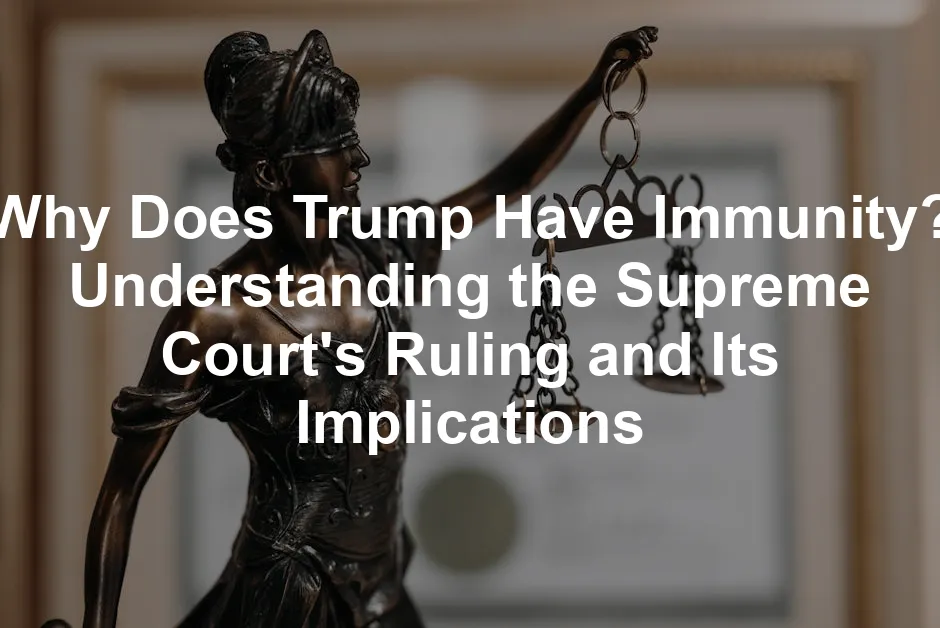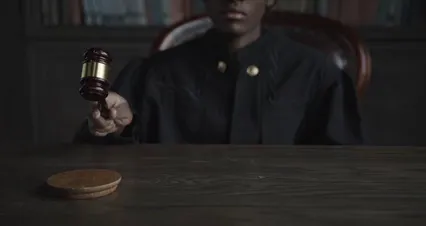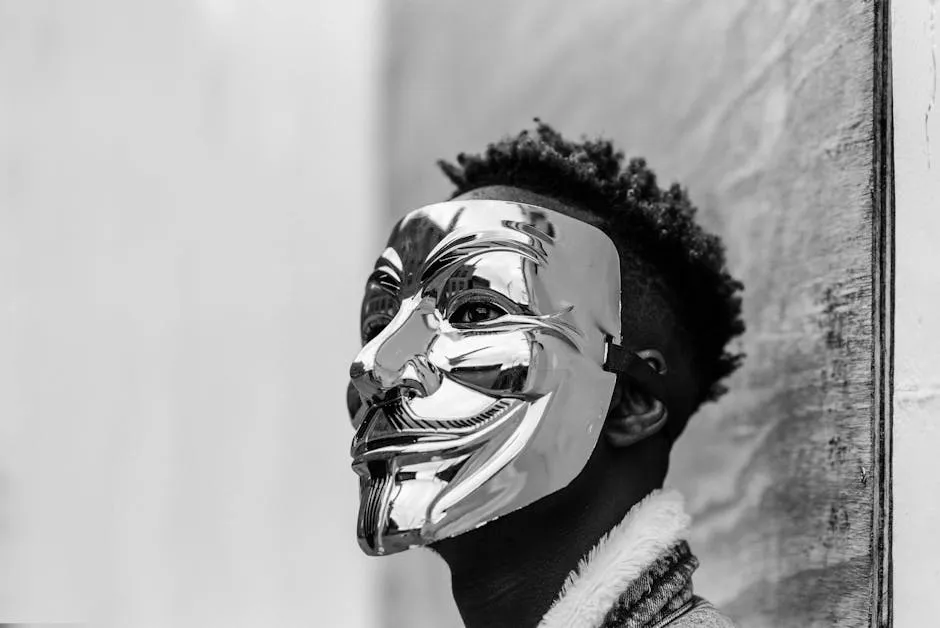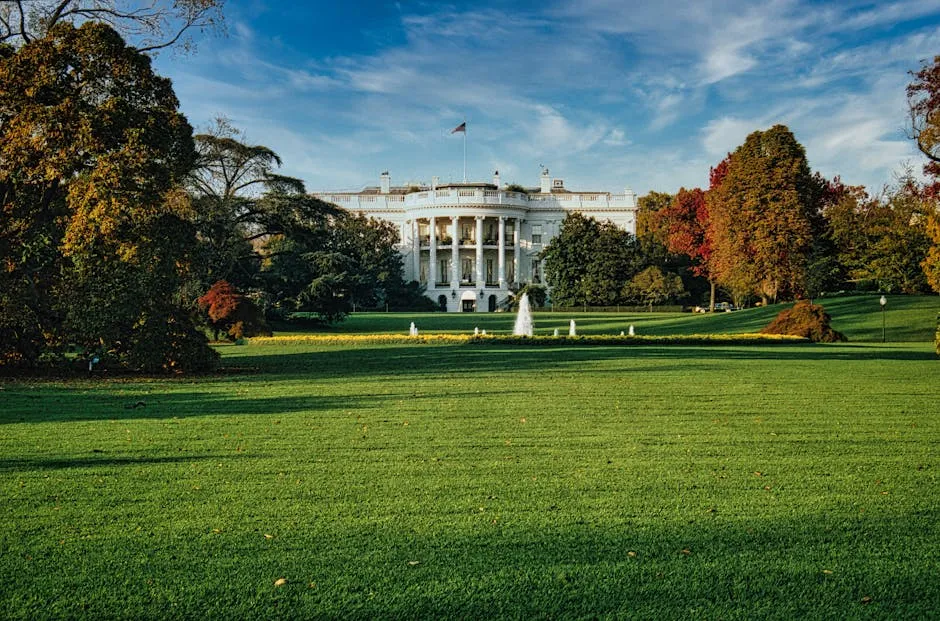
Why Does Trump Have Immunity? Understanding the Supreme Court’s Ruling and Its Implications
Introduction
Recently, the Supreme Court ruled on Donald Trump’s presidential immunity. This decision is crucial for the rule of law and accountability. As Trump faces multiple legal challenges, understanding this ruling’s significance is vital for all of us.
While you’re diving into the complexities of law, why not enrich your reading experience with a great book? Check out “The Supreme Court: The Personalities and Rivalries Behind History” by Jeffrey Rosen. It’s a fascinating insight into the human elements that shape our laws and could provide you with a deeper understanding of the current legal landscape.

Summary and Overview
The Supreme Court’s ruling establishes that former presidents have significant immunity from prosecution for actions taken during their time in office. In Trump v. United States, the court decided, by a 6-3 vote, that presidents are generally immune for official acts, including actions related to their constitutional duties. This ruling primarily protects Trump regarding attempts to influence the Justice Department in the wake of the 2020 election results.
Critics argue this ruling sets a troubling precedent for future presidents, potentially allowing them to act without legal accountability. Legal experts have reacted strongly, with many expressing concerns about the implications for democracy and accountability. Some politicians have praised the decision, while others, including President Biden, have condemned it as a dangerous move away from the principle that no one is above the law. The complexity of distinguishing between official and unofficial actions adds further challenges to Trump’s ongoing legal battles.

The Supreme Court Ruling: Key Points
Overview of the Decision
On July 1, 2024, the U.S. Supreme Court ruled that former President Trump has substantial immunity from criminal prosecution for actions taken while in office. The decision passed with a 6-3 vote, predominantly along partisan lines. Chief Justice John Roberts led the majority opinion, emphasizing that presidents possess “presumptive immunity” for official acts tied to their constitutional responsibilities. This ruling is significant as it establishes that actions performed as part of a president’s official duties cannot be prosecuted. Historically, similar cases have often favored presidential immunity, but this ruling appears to extend that protection further. Critics warn this sets a concerning precedent for future executive conduct, allowing presidents to evade accountability under certain conditions.
If you’re curious about the foundational texts that have shaped American governance, consider picking up “The Federalist Papers” by Alexander Hamilton, James Madison, and John Jay. It’s a brilliant collection that provides insight into the thoughts of the Founding Fathers and their vision for the nation.
What Actions Are Considered Official?
The distinction between official and unofficial actions is crucial in understanding this ruling. Official acts stem from core constitutional powers, such as issuing pardons or directing military actions. In contrast, unofficial actions do not enjoy the same protection. This classification impacts Trump’s ongoing legal challenges significantly. For instance, discussions with the Department of Justice regarding election procedures are deemed official acts, granting him immunity. Historical examples, like President Nixon’s actions during Watergate, illustrate how defining these boundaries is complex yet essential. The Supreme Court’s ruling now leaves it to lower courts to determine which of Trump’s actions fall into these categories, potentially complicating his criminal cases further.
Dissenting Opinions and Concerns
The dissenting opinions from Justices Sotomayor, Kagan, and Jackson raise serious alarms about accountability. Justice Sotomayor expressed deep fears for democracy, stating that the ruling allows presidents to misuse power without facing legal repercussions. She emphasized that this decision essentially positions the president as “a king above the law.”
Justice Kagan added that the ruling undermines checks and balances vital to a functioning democracy. She warned that it could embolden future presidents to act outside the law, knowing they might escape accountability. Justice Jackson echoed these concerns, arguing that this precedent could lead to abuses of power that threaten democratic principles.
Public opinion reflects these anxieties. Recent surveys show that nearly 70% of Americans believe that no one, including the president, should be above the law. This ruling potentially erodes accountability, raising critical questions about its long-term implications for democracy and the rule of law.

Implications of the Ruling
For Donald Trump’s Legal Challenges
The Supreme Court ruling significantly shapes Donald Trump’s ongoing legal battles. By granting him substantial immunity for actions deemed official, the decision complicates the prosecution of his criminal cases. Trump’s attempts to influence the Justice Department regarding the 2020 election results are now protected under this immunity.
As a result, the timeline for his trials may face significant delays. The lower courts must determine which actions fall under official duties versus personal conduct. This could push trial dates beyond the upcoming election, allowing Trump to campaign without the looming threat of immediate legal consequences.
Currently, Trump faces serious charges, including conspiracy to defraud the government. With this ruling, his defense strategies may pivot, focusing on arguing that many of his actions were official, thus shielding him from prosecution. The outcome of this legal landscape could redefine the boundaries of presidential accountability for years to come.

The implications of this ruling for Trump’s legal challenges are significant, raising questions about accountability. why do scientists study deja vu and its implications for the future
For Future Presidential Accountability
The Supreme Court ruling on Trump’s immunity raises important questions about future presidential conduct. This decision sets a precedent that could shield future presidents from legal repercussions for their actions while in office. Historically, presidents have faced scrutiny for misconduct; for example, Nixon during Watergate and Clinton amid his impeachment. However, this ruling shifts the balance, allowing presidents to operate with expanded immunity.
If you’re looking to understand more about the foundations of American law, grab a copy of “The Constitution of the United States: A Transcription”. This official document is essential for anyone wanting to grasp the legal framework that governs our nation.

Critics warn of potential abuse of power. If presidents can act without fear of accountability, it undermines the rule of law. This could lead to unchecked authority, enabling actions that might cross ethical lines. Already, surveys show that around 70% of Americans believe accountability is essential for democracy. As we consider the implications, it’s vital to remember that the precedent set could shape the legal landscape for years to come, impacting how future leaders govern and interact with the law.
Public and Political Reactions
Reactions from Political Figures
The political landscape has shifted dramatically following the Supreme Court’s ruling. Donald Trump celebrated the decision, viewing it as a triumph for his position. He declared it a “big win for our Constitution and democracy.” In contrast, President Biden condemned the ruling, emphasizing that “no one is above the law.” He warned of its dangerous implications for future governance.
Other political figures echoed these sentiments. Senate Majority Leader Chuck Schumer criticized the ruling, labeling the court as “MAGA SCOTUS.” Meanwhile, Republican House Speaker Mike Johnson praised the decision, viewing it as a victory for Trump’s ongoing campaign. Polls indicate mixed public sentiment, with many expressing concern about presidential power. As the 2024 elections approach, the ruling could play a significant role in shaping candidates’ strategies and public perceptions. This evolving dialogue highlights the ongoing clash between accountability and executive power in American politics.

Public Sentiment and Protests
Public reaction to the Supreme Court’s ruling on Trump’s immunity has been intense and varied. Social media exploded with opinions, showcasing a mix of outrage and support. Many critics express concern that this ruling places former presidents above the law, fearing it could lead to unchecked power.
Protests erupted outside the Supreme Court, with demonstrators voicing their disapproval. Polls indicate that around 70% of Americans believe no one should be above the law, including the president. This sentiment resonates especially among younger voters and those advocating for accountability in government.
Conversely, Trump’s supporters celebrate the ruling, viewing it as a validation of his actions while in office. The divide in public sentiment highlights the polarized nature of American politics today. As the 2024 elections approach, these reactions will likely influence campaign strategies and voter turnout.

Continued public engagement on social media will play a critical role in shaping the narrative around presidential accountability. As we reflect on these responses, it’s vital to recognize the broader implications for democracy and governance in America.
Conclusion
In summary, the Supreme Court ruling on Trump’s immunity raises vital questions about presidential power and accountability. While it may provide legal protection for past actions, it also sets a concerning precedent for future leaders. Ongoing scrutiny of presidential actions is essential to ensure that no one remains above the law. As citizens, we must remain vigilant and engaged, advocating for transparency and accountability in our government.
If you’re interested in understanding the broader implications of law and democracy, consider reading “A People’s History of the Supreme Court” by Peter Irons. It’s a compelling read that will broaden your perspective on the judiciary’s role in shaping American society.
Please let us know what you think about our content by leaving a comment down below!
Thank you for reading till here 🙂
All images from Pexels




